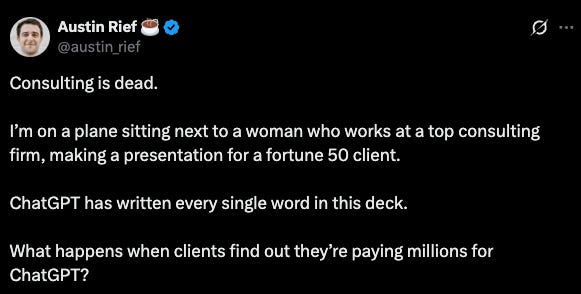Consulting Is Not ‘Selling Your Expertise’ (nor will it be replaced by AI)
A big misconception is that consulting is trading your expertise for money. It's not, consulting is the work of trading your methodology and personal abilities to bring about client outcomes for money
Hi, I’m Rich. Welcome to my weekly newsletter where I share systems and frameworks for scaling your consulting practice from $0 to $1m+ in revenue.
You can get 1:1 personal coaching or explore my new program: Indispensable Consulting Systems.
“AI Killed Consulting”
There’s no shortage of these kinds of stories.
Skipping aside from the fact that this story is surely apocryphal, there might be a point where you need to respond to the question, ' Why do we need a consultant?’
See: If You Can’t Answer This Question, Clients Won’t Hire You
AI Raises The Bar For Consultants - That’s A Good Thing
It’s worth acknowledging the potential downsides of AI for consultants that we need to consider. These include:
AI replaces tasks. We can easily imagine AI replacing tasks, (not entire roles). Data analysis, benchmarking, report generation, or scenario modelling are already being done faster and cheaper by AI tools. AI will replace (or reduce the need for) research/slide-creating roles undertaken by more j…



